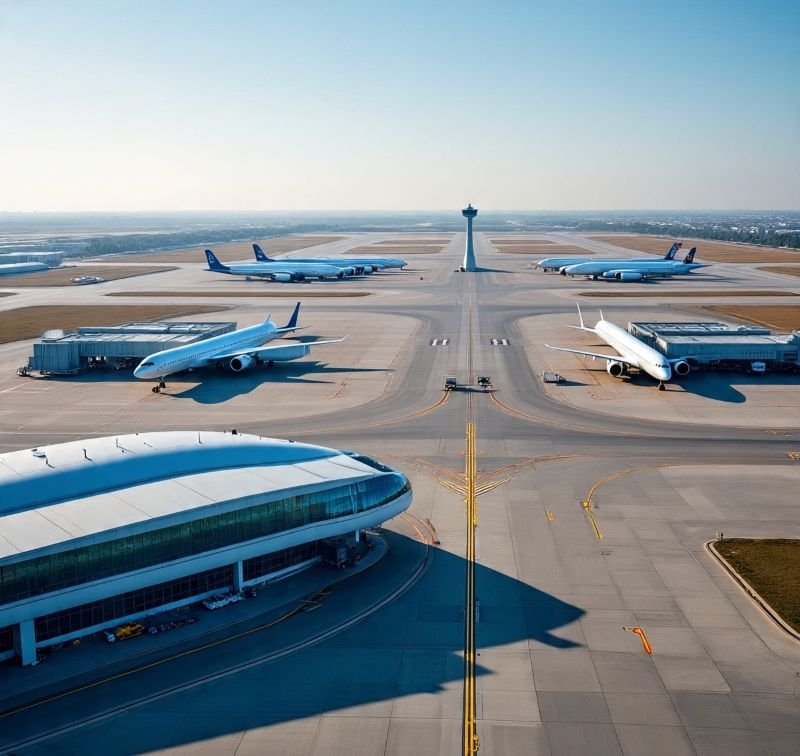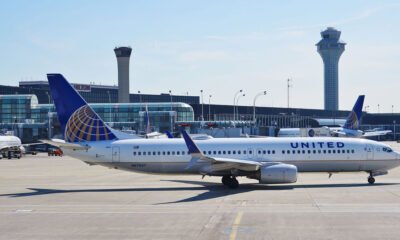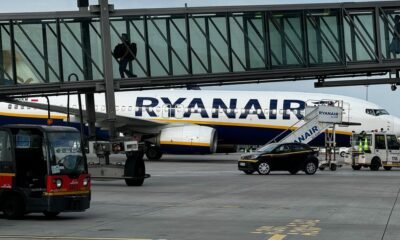Flight Buzz
Madrid, Barcelona, Malaga, Ibiza, and Palma de Mallorca Among Spanish Airports Hit by Nationwide Baggage Handler Strikes Disrupting Flights Travelers Urged to Reassess Travel Insurance Before Flying with Ryanair All You Need to Know

Published on
August 7, 2025 |
By: TTW News Desk
Global Aviation on Alert Amid Spain’s Airport Worker Strike
It was reported that a substantial wave of travel disruption began brewing with the announcement that over 3,000 baggage handling staff in Spain would launch a long-term strike starting mid‑August, prompting widespread concern across the global aviation sector. Observers emphasized that because Spain acts as a critical European transit hub, flight schedules and international itineraries around the world were likely to be adversely affected.
Passengers traveling through Spanish airports, particularly those passing onward to other destinations, were cautioned that any operational delays in Spain could trigger cascading disruptions far beyond national boundaries. Analysts noted that this situation had the potential to derail connections, delay departures, and create knock-on effects across airlines unfamiliar with the strike’s direct involvement but reliant on Spanish ground services.
At the core of the unrest were more than 3,000 baggage handlers employed by a ground services operator. It was pointed out that disruptions to baggage processing—a seemingly behind-the-scenes operation—could have visible consequences on flight punctuality, passenger experience, and airport throughput internationally.
Strike Launches August 15 Across a Dozen Major Hubs
It was confirmed that the labour action would officially start on August 15, impacting 12 primary airports in Spain:
- Madrid‑Barajas
- Barcelona‑El Prat
- Valencia
- Seville
- Alicante
- Ibiza
- Malaga
- Palma de Mallorca
- Tenerife South
- Girona
- Lanzarote
- Santiago de Compostela
It was disclosed that the strike would unfold during three critical daily time frames: from 05:00 to 09:00, 12:00 to 15:00, and 21:00 to 23:59, aligning with peak operational windows in airport schedules. Travelers with flights during these periods were warned of elevated risk of delays and procedural slowdowns
Furthermore, sources emphasized that after the initial three days—August 15, 16, and 17—the strike would recur every Wednesday, Friday, Saturday, and Sunday until the end of 2025, transforming it from a short-lived event into a sustained challenge for airline operations and passenger movement through Spain
Underlying Causes: Workers Demand Fair Conditions
Reports indicated that the strike was the culmination of mounting frustration among ground workers over what they alleged were systemic violations of labour rights and unstable employment conditions. Unions such as UGT and CGT had pointed to coercive overtime policies, punitive disciplinary sanctions (including unpaid suspensions of up to 36 days) for refusing extra hours, and a lack of consolidated schedules for part-time staff as key grievances
Union leaders argued that these practices created insecurity and disregard for existing labour agreements governing pay, scheduling, and job stability. The action, they insisted, was intended to force meaningful negotiation toward improved, lawful working conditions for more than 3,000 employees nationwide
Passenger Impact: Delays, Baggage Mix‑ups, and Itinerary Chaos
Travel experts and union statements both acknowledged that even though minimum service levels would legally remain in force, the repeated, large‑scale stoppages during critical hours were expected to cause major slowdowns. Baggage processing backlogs, slower aircraft turnarounds, and check-in delays were all flagged as probable consequences
Passengers were urged to avoid checking luggage where possible, with carry‑on only travel offering the most reliable way to reduce exposure to lost or delayed baggage. Lessons drawn from past incidents—including luggage not arriving for days—reinforced this advice
Travelers were also reminded of compensation rights under EU 261/UK 261, which may apply if flight delays exceed three hours—unless the strike is deemed an extraordinary circumstance. In previous rulings, strikes by subcontracted ground workers had not automatically exempted airlines from compensation responsibilities, suggesting that passengers could have strong grounds for reimbursement if flights were delayed or cancelled
Insurance and Policy Caveats: What Everyone Must Check
It was noted that most standard travel insurance policies did not automatically cover industrial action unless explicitly included as an add-on or higher-tier benefit. Travelers were strongly advised to review their policy terms carefully to determine whether strike disruption, missed connections, or overstays due to delays were included in coverage.
Important points to confirm included:
- Whether the strike classifies as a “known event” at the time of purchase—policies often exclude coverage for events that were public knowledge at purchase.
- Whether missed departures, accommodation costs, or alternative transport expenses were incorporated.
- Whether the policy clearly covers industrial action and includes provisions for extended delays, stranded travellers, or rebooking costs.
Travelers who had already booked were encouraged to contact their airline immediately to ask about rebooking, alternate routing, or compensation options. Those planning trips ahead were urged to select policies with disruption add-ons and to retain all receipts for potential claims. Adjusting to avoid strike days or hours, if feasible, was highlighted as a practical strategy to limit risk.
Wider Effects on Season‑Long Tourism
Given the strike’s scheduled continuation through 30 December 2025, its impact was projected to extend well beyond the summer holiday season into autumn, winter, and even early 2026. Major airports, particularly Madrid, Barcelona, and Palma de Mallorca, were expected to bear the brunt of ongoing disruption
Some industry analysts predicted that frustrated travelers might reroute through alternate airports in neighboring countries, shifting tourism flows and putting additional strain on airports without the infrastructure to handle sudden surges. Such changes could also impact booking patterns, accommodation demand, and the overall mood around travel to Spain.
Recommendations for Travelers Leaving Soon
It was suggested that passengers with travel plans involving any of the listed Spanish airports take specific steps to minimize inconvenience:
- Verify coverage for strike-related disruptions in insurance policies immediately.
- Understand the definition of a “known event” within the policy terms, which can affect eligibility.
- Contact your airline early to confirm options for rebooking or compensation.
- Document always unforeseen costs such as extra hotels, meals, or transport.
- Where possible, book flights outside of strike windows—especially avoiding check-in and baggage during the outlined timeframes.
These precautions were considered essential for maintaining control over potentially chaotic travel experiences, reducing both stress and financial exposure.
Portable Luggage, Delays, and Destination Confidence
Industry voices pointed out that travelers who strictly packed carry‑on only stood the best chance of avoiding delay issues tied to lost or held luggage. Reddit users recounted stories of unchecked bags failing to arrive for days during similar stoppages, underscoring the wisdom of securing essentials aboard one’s person
If disruptions grew persistent, it was forecast that tourist confidence in Spain—notably during busy seasons—could decline. Some vacationers might redirect plans to destinations perceived as more stable. This shift could erode demand in regions like Barcelona, Malaga, Ibiza, and the Balearics, prompting local tourism services to adapt quickly to reduced footfall or altered timing of arrivals.
Economic and Operational Ramifications Across the Industry
Travel analysts emphasized that the ripple effects of the strike would affect not only individual travelers but also industry operations and revenue flows. Airlines might need to reschedule flights, adjust turnarounds, and allocate additional buffer time between connections to compensate for slower baggage handling.
Airport infrastructure could face bottlenecks, particularly in shared areas where multiple airlines used the same cargo belts or ramp equipment—delays in one zone could cascade into adjacent terminals. Ground‑handling limitations could create aircraft stacking, queueing issues, and delays impacting on-time performance metrics.
Tourism providers—hotels, restaurants, local attractions—might see changes in arrival times, cluster demand shifts, and increased customer service queries. The need for transparent communication and flexibility became paramount for service providers in retaining traveler trust.
The Underlying Story: Workers With Grievances Demand Change
As coverage made clear, labor representatives detailed several reasons behind the escalation, including alleged imposition of overtime hours without consent, disciplinary actions for signing off from mandated extra shifts, lack of transparent bonus and compensation structures, and restrictions on returning to work post‑medical leave.
Unions had demanded that sanctions be lifted, work conditions formalized, and meaningful negotiations initiated to improve contracts for over 3,000 employees across Spain. The failure to engage meaningfully was stated as a key reason the fourth quarter 2025 strikes remained scheduled
How the Travel Industry Must React
Travel industry leaders were urged to:
- Closely monitor the transport ministry’s declaration of minimum service levels, which under Spanish law would determine how many operational functions must continue even during strikes.
- Communicate clear guidance to travelers about arrival advisories, check-in times, and compensation rights, especially in the context of EU 261 and UK equivalents.
- Prepare contingency staffing and logistics adjustments to soften potential knock-on effects, such as deploying mobile stairs or reassigning baggage equipment.
- Advise passengers to build in extra time for connections through Spanish airports, or offer alternative routes where possible.
Such preparation was considered essential to mitigate the strike’s impact and preserve booking confidence during volatile travel windows
The Bigger Picture: A European Strike Trend?
It was remarked that this strike in Spain reflected a broader wave of labour unrest in the aviation sector across Europe, where increasing staff shortages and rights disputes were pushing unions into action. This trend suggested that similar disruptions could arise elsewhere, making proactive planning critical for travel stakeholders and holiday planners alike.
Final Reflection
It was underscored that the unfolding ground‑handling strike in Spain—spanning dozens of weekends and peak travel slots—reflected more than a personnel dispute; it symbolized a deeper fracture in operational trust and worker rights frameworks.
Travelers, airlines, and hospitality providers were encouraged to:
- Stay informado and monitor how the strike evolves through December 2025.
- Promote flexibility in itineraries and encourage insurance with disruption coverage.
- Leverage communication to maintain customer confidence, especially when compensating for delays or rebooking.
Despite its projected duration, it was suggested that with careful planning and transparency, the disruptions could be managed well enough to preserve travel experiences worldwide—even in the face of one of the most prolonged airport workforce actions of recent memory.
Highlights to Remember:
- Over 3,000 baggage handlers across Spain are involved in the strike.
- Strikes commence on 15 August 2025, covering 12 major airports, including Madrid, Barcelona, Valencia, Seville, and Palma de Mallorca.
- Work stoppages occur during 05:00–09:00, 12:00–15:00, and 21:00–23:59, then repeat Wednesday, Friday, Saturday, and Sunday through the end of 2025.
- Travelers are urged to verify travel insurance coverage, particularly for industrial action or known events.
- Carry‑on only travel is recommended to minimize risk of lost or delayed baggage.
- The strike is likely to cause global flight ripple effects, with potential tourism shifts away from Spain, as holiday plans adapt.
- Industry stakeholders should plan proactively, update passengers, and adapt logistics to maintain service in turbulent conditions.
Flight Buzz
Air Transat Expands to Brazil with New Nonstop Flights to Rio de Janeiro for Winter 2025-26

Published on
August 8, 2025 |
By: TTW News Desk
Air Transat is making a big push to Brazil with new nonstop flights from both Toronto and Montreal to Rio de Janeiro beginning in the winter 2025-26 season. The new offering is part of the carrier’s ongoing growth strategy focused on increasing presence in existing southern leisure and transatlantic markets.
New Service to Rio de Janeiro
The Canadian carrier will operate flights from Toronto Pearson to Rio de Janeiro Galeão International Airport twice a week, on Wednesdays and Saturdays. Additionally, it will offer a once-weekly service from Montreal-Trudeau Airport on Thursdays. All flights will be operated using the modern Airbus A330 aircraft, ensuring comfort and efficiency for travelers.
Following Air Canada’s announcement of its Toronto to Rio de Janeiro route set for December 2025, Air Transat introduces its own direct service to the Brazilian city. Until now, Montreal has lacked a direct link to Brazil, making Air Transat the first Canadian carrier to fill this gap, offering direct access to the Brazilian metropolis for the first time.
Market Insights
Brazil has long been a popular destination for Canadian travelers, with Toronto–São Paulo being the largest city pair between the two countries in 2024. Additional key routes feature flights from Montreal and Vancouver to São Paulo. According to Sabre Market Intelligence, Canada–Brazil traffic saw 352,000 passengers in 2024, marking a slight decrease of 1.6% from the previous year. Despite this, the demand for direct routes to Rio de Janeiro has remained strong, especially with Air Transat now serving as a direct option from Montreal and Toronto.
A Strategic Network Expansion
This new route to Brazil is a key element of Air Transat’s broader plan to enhance its network during the winter 2025-26 season. The airline is adding 14 new routes and increasing frequencies across key markets, reflecting a roughly 6% increase in capacity year over year. Alongside Brazil, Air Transat is also launching new routes to Guadalajara, Valencia, Madrid, Bordeaux, and Istanbul. This expansion will not only increase the airline’s footprint in the southern leisure markets but also cater to the growing demand for transatlantic travel.
New Routes from Smaller Markets
In addition to these new international destinations, Air Transat will also operate seasonal flights to popular Southern destinations from smaller Canadian markets such as Charlottetown, Windsor, and Fredericton. This move is aimed at providing more Canadians with access to international destinations, while also tapping into underserved markets.
A New Era of Connectivity Between Canada and Brazil
Air Transat’s entry into the Brazil market signals a new era of connectivity between Canada and Brazil, especially for Montreal residents who have previously had limited direct flight options to Rio de Janeiro. The new service will provide a convenient and seamless travel experience, catering to the growing demand for international leisure travel to one of South America’s most iconic cities.
With the expansion of its network, Air Transat continues to position itself as a key player in the competitive leisure travel sector. The new nonstop flights to Rio de Janeiro, alongside other seasonal additions, will further enhance the airline’s ability to meet the needs of travelers seeking new destinations and exciting holiday experiences.
Introduction of Rio de Janeiro and service to Brazil is also great news for Canadian travellers who can enjoy this new destination with Air Transat. With direct flights from Toronto and Montreal, the airline will prove to be an important driver of tourism development between Canada and Brazil. This expansion and additional routes will help to cement Air Transat’s status as the leader in leisure travel, accommodating the increased demands of vacation and business flyers.
Flight Buzz
United Airlines outage grounds US flights disrupts India-bound travel and diaspora plans- The Week

Houston, Aug 7 (PTI) A sweeping technology outage forced United Airlines to ground flights across the US, causing widespread delays and cancellations that affected thousands of passengers — including many from the Indian diaspora flying home for weddings, family visits, or returning to work after summer.
The glitch, traced to the airline’s aging Unimatic system used for flight dispatch and load planning, brought operations at major hubs to a halt for several hours on Wednesday.
The Federal Aviation Administration (FAA) confirmed that United requested a nationwide ground stop, which has since been lifted, but delays were still rippling across the network on Thursday.
United called it a “controllable delay”, pledging to cover hotels and related costs where needed, and emphasized that the outage was not cybersecurity-related.
“Safety is our top priority, and we’ll work with our customers to get them to their destinations,” the airline said in a statement.
FlightAware, a website tracking flight disruptions, reported that about 35 per cent of all the airline’s flights were delayed and 7 per cent were cancelled Wednesday.
United’s travel alert warned of disruptions through the weekend at key US and international airports including Newark, Houston, Chicago, Washington, Los Angeles, San Francisco, Denver, Orlando, New York, Honolulu, Guam, London, Frankfurt and Munich.
Among those impacted was Ishya K, a young consultant, originally from Houston, and now working in Manhattan, who had flown over the weekend to visit her family. Her evening flight to New York’s LaGuardia (LGA) was first delayed for hours and then abruptly cancelled just before midnight.
“There was so much chaos at the airport as United didn’t know what was going on.They finally told us around 11 pm that we weren’t flying out,” she said. “I reached home past midnight after hours at the airport, and now I’ve been rebooked for a late flight today and hope there are no more delays.”
Others missed international connections altogether. Michael Tran, who was headed to Japan from Houston via San Francisco, was stranded overnight and unsure whether he’d make it in time for a long-planned trip.
For the Indian-American community, peak summer travel collided with deeply personal commitments. Nisha Mehra, a professional, originally from Delhi, missed her flight to India — and with it, the first wedding in her family she would have attended in a decade.
“This was my chance to reconnect with my family in Chandigarh after so many years,” she said, tearing up at the terminal. “I had my bags packed with gifts for all the cousins. Now I’m hoping I can get there before the last event.”
Passengers across the country described hours inside aircraft after landing, waiting for gates to open due to a system-wide standstill. “The first hour, people were already walking around the cabin because there was nothing to do,” said one passenger. “Eventually they found a gate, but it still took another 45 minutes to get there.”
The FAA said it continues to assist United in resolving the backlog. “We’ve offered full support to help address their flight backlog and remain in close contact,” the agency said.
United apologised publicly via social media. “Hey there, we apologise for the travel disruption today,” it said in response to customer complaints. “Our teams are working to resolve the outage as quickly as possible.”
While operations are slowly resuming, United warned that passengers flying in or out of affected cities may continue to face delays.
Flight Buzz
Tourism Boost Delayed: Now, FlyGabon Suspends Libreville-Johannesburg Flights, Service to Restart in August

Published on
August 7, 2025 |
By: TTW News Desk
FlyGabon has put its flights from Libreville, Gabon, to Johannesburg, South Africa, on hold for now. The airline is waiting for final regulatory approval to register a new wet-leased aircraft. This situation interrupts its plan to keep consistent service between the two key cities, which are important for business and tourism traffic across the continent.
Why the Flights Are Paused
FlyGabon had arranged to deploy a newly leased aircraft to handle an increase in passenger demand. The plane needs to be registered with the South African International Air Services Council (IAASC) under its Foreign Operators Permit (FOP) before it can fly. Since that approval is still in the queue, the airline has opted to suspend the route temporarily to stay within the regulatory framework.
When to Expect Flights Again
The airline hopes to receive the updated Foreign Operators Permit in the coming days and plans to restart flights on Sunday, August 10. Customers whose travel plans were disrupted will be given options, including rebooking on other flights or choosing a full refund.
Impact on Tourism and Travel
The Libreville-Johannesburg route is key for both tourists and business travellers, connecting Gabon and South Africa—two countries that are quickly strengthening economic and tourism links. Johannesburg is the main gateway to Southern Africa, buzzing with cultural exchanges and business events. Travellers from across Africa and other continents pass through the city every day. Because FlyGabon has suspended the route, tourists and business people from Libreville and Gabon now face a more complicated journey to and from these regions.
This service pause is likely to shift the flow of tourists, especially the passengers moving from Gabon to South Africa. South Africa draws visitors with its layered history, varied cultures, and first-rate attractions. The direct flight between Libreville and Johannesburg was particularly useful for business travelers and tourists aiming for iconic sites like the Cradle of Humankind, the vibrant streets of Soweto, and the shops of Sandton City, among many others.
Alternatives and Customer Support
Following the temporary suspension of its flights, FlyGabon is offering passengers the choice of a full refund or rebooking on a later date. The airline’s customer support is on standby to help with new itineraries. Passengers flying from Libreville to Johannesburg might consider other carriers for the moment, but FlyGabon is eager to resume its direct service as soon as it receives the final regulatory okay.
Regulatory Context: Foreign Operators Permit
The pause in FlyGabon’s Johannesburg flights serves as a reminder of the vital role of regulatory compliance in international air travel. Any foreign airline planning to enter South African airspace must first secure the Foreign Operators Permit from the International Air Services Council. This approval verifies that the carrier meets South Africa’s safety, operational, and financial benchmarks.
While the current disruption is temporary, it illustrates the regulatory hurdles airlines face as they grow in overseas markets. A swift and successful application for the Foreign Operators Permit will enable FlyGabon to keep its commitments and to pursue new routes across Africa.
Future Implications for FlyGabon’s Network Expansion
The current aircraft suspension has highlighted FlyGabon’s long-term vision for African aviation. The airline is committed to broadening its international reach by updating its fleet and introducing additional routes to key cities across the continent. Operating as one of the few registered carriers based in Gabon, FlyGabon is vital for linking the region. Once the aircraft registration issue is settled, the airline is poised to press on with its growth plans, with renewed energy for the South African markets.
The Libreville-Johannesburg lane remains a cornerstone of FlyGabon’s international operation, and its prompt return will open Southern Africa’s booming business and tourism sectors to more travellers. Interest in this route has remained strong, and FlyGabon is determined to restore the full schedule as quickly as possible to meet the needs of the customers who count on the service.
Conclusion
The pause in FlyGabon flights from Libreville to Johannesburg is a hassle, but it’s a short-term bump. The airline is busy sorting out the required permissions, and as soon as it has the green light, flights will restart, keeping the important link between Gabon and South Africa strong. Looking ahead, the signs still point up. FlyGabon is determined to keep travellers happy and to keep expanding its reach.
-

 Brand Stories2 weeks ago
Brand Stories2 weeks agoBloom Hotels: A Modern Vision of Hospitality Redefining Travel
-

 Brand Stories2 weeks ago
Brand Stories2 weeks agoCheQin.ai sets a new standard for hotel booking with its AI capabilities: empowering travellers to bargain, choose the best, and book with clarity.
-

 Destinations & Things To Do3 weeks ago
Destinations & Things To Do3 weeks agoUntouched Destinations: Stunning Hidden Gems You Must Visit
-

 Destinations & Things To Do2 weeks ago
Destinations & Things To Do2 weeks agoThis Hidden Beach in India Glows at Night-But Only in One Secret Season
-

 AI in Travel3 weeks ago
AI in Travel3 weeks agoAI Travel Revolution: Must-Have Guide to the Best Experience
-

 Brand Stories1 month ago
Brand Stories1 month agoVoice AI Startup ElevenLabs Plans to Add Hubs Around the World
-

 Brand Stories4 weeks ago
Brand Stories4 weeks agoHow Elon Musk’s rogue Grok chatbot became a cautionary AI tale
-

 Brand Stories2 weeks ago
Brand Stories2 weeks agoContactless Hospitality: Why Remote Management Technology Is Key to Seamless Guest Experiences
-

 Asia Travel Pulse1 month ago
Asia Travel Pulse1 month agoLooking For Adventure In Asia? Here Are 7 Epic Destinations You Need To Experience At Least Once – Zee News
-

 AI in Travel1 month ago
AI in Travel1 month ago‘Will AI take my job?’ A trip to a Beijing fortune-telling bar to see what lies ahead | China













You must be logged in to post a comment Login